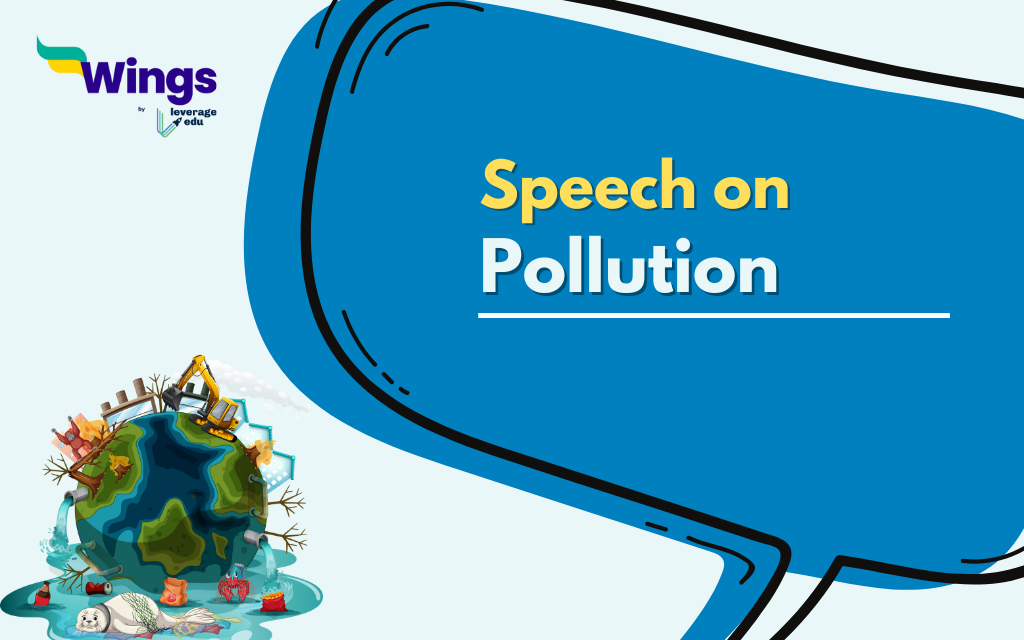Speech on Pollution: Pollution is the introduction of any undesirable substance into our environment, leading to the contamination of natural resources. These harmful substances, known as pollutants, have become a significant existential threat to all living beings on Earth. Today, every nation, region, and community grapples with the challenges posed by pollution, a problem primarily driven by human activities that have been degrading our natural environment for centuries.
From burning fossil fuels to deforestation, nearly every self-serving human activity contributes to environmental pollution. The cars we drive, the plastic products we use, the clothes we wear, and the waste we generate—all these actions play a role in polluting our planet. In response to this escalating crisis, various governmental and international organizations have been established to address pollution and mitigate its impacts. One notable entity is the United Nations Environment Programme (UNEP), which tackles pollution, its causes, and its consequences on a global scale.
Know more about World Environment Day Speech for School Students.
School students are often asked to deliver a speech on pollution. To help students with their speech preparation, here are sample speeches that they can refer to.
Also Read: Speech on Global Warming
Also Read: Speech on Deforestation for School Students
1-Minute Speech on Pollution
‘Hello and welcome to all my mates and teachers. Today, I stand before you to present my speech on pollution. There is a lot about pollution in our Geography books. From the causes of pollution to its preventive measures. But have we ever followed any of these preventive measures?
There are different types of pollution, such as air, soil, water, radioactivity, noise, etc. All these pollutions have different sources, which not only disturb the natural environment but also have adverse effects on human health, biodiversity, ecosystems, and the climate.
Pollution is a fight that requires a collective effort from developed and developing countries. Recently, there was a debate where the first world countries were requesting others to equally take responsibility for environmental pollution. However, this is not the case, because the major damage to the environment is caused by developmental activities in these first-world countries.
The damage is already down, and now is not the try to cry over spilled milk. We are in this together, and we have to take responsibility for our actions. With well-structured, alternative strategies and cooperation, we can combat pollution.
Thank you.’
2- Minute Speech on Pollution
‘Hello and welcome to everyone present here. As a conscious human being, I am happy to present my speech on pollution. Pollution is known as the introduction of unwanted substances into the environment, which disrupts the natural environment and overall health of the planet. One of the major concerns of the pollution is climate change.
The history of pollution is older than one century. In 1896, a Swedish scientist named Svante Arrhenius first predicted the changes in atmospheric carbon dioxide levels, which may substantially increase the surface temperature and because a major cause of global warming.
The first international summit to consider pollution as a global concern was the 1972 Stockholm Convention. The United Nations Environment Programme (UNEP) was the outcome of this international climate convention. UNEP deals with all environmental problems at the global level and organizes various environmental programs to raise awareness about pollution, climate change, global warming, etc.
Today, our terrestrial and marine ecosystems are facing existential threats due to pollution. Deforestation, industrial waste, and chemical pollutants are wreaking havoc on biodiversity. The loss of habitats, the decline of species, and the imbalance in our ecosystems paint a grim picture of the toll pollution takes on our natural world.
There are different types of pollution, such as air, water, noise, soil, radioactivity, thermal, plastic, etc. Burning of fossil fuels, industrial processes, vehicle emissions, and agricultural activities causes air pollution. Industrial discharges, agricultural runoff, untreated sewage, oil spills, and dumping of chemicals in rivers, ponds and lakes cause water pollution. Improper disposal of industrial waste, agricultural practices, use of pesticides and fertilizers, and contamination from hazardous substances cause soil pollution. The list goes on as new types of pollution are being discovered by scientists.
Pollution not only affects our environment but also disrupts our daily life as it affects our health, and biodiversity and is a major cause of climate change. Every country and its citizens must recognize the importance of addressing pollution through regulations, sustainable alternative practices, and environmental conservation efforts.
Thank you.’
Also Read: Essay on Environmental Pollution in 100 and 200 Words
FAQs
Ans: Pollution is known as the introduction of unwanted substances into the environment, which disrupts the natural environment and overall health of the planet. One of the major concerns of the pollution is climate change.
The history of pollution is older than one century. In 1896, a Swedish scientist named Svante Arrhenius first predicted the changes in atmospheric carbon dioxide levels, which may substantially increase the surface temperature and because a major cause of global warming.
The first international summit to consider pollution as a global concern was the 1972 Stockholm Convention. The United Nations Environment Programme (UNEP) was the outcome of this international climate convention.
Ans: Soil, Air, Water, Thermal, Radioactivity, Noise, and plastic are the major types of pollution.
Ans: Burning of fossil fuels, industrial processes, vehicle emissions, industrial discharges, agricultural runoff, untreated sewage, oil spills, and dumping of chemicals in rivers, etc. are some of the major causes of pollution.
Related Articles
For more information on such interesting speech topics for your school, visit our speech writing page and follow Leverage Edu.


 One app for all your study abroad needs
One app for all your study abroad needs












 60,000+ students trusted us with their dreams. Take the first step today!
60,000+ students trusted us with their dreams. Take the first step today!